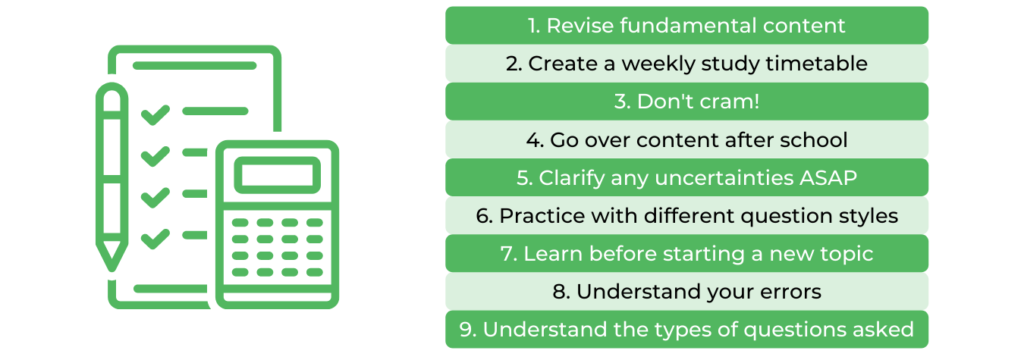Starting Unit 3 of Year 12 and want to start prepping for your QCAA Maths Methods external exam?
With the exam being worth 50% of your final grade, it’s considered one of the most crucial assessments you’ll do in Maths Methods. You may be assessed on any or all of the content from Units 3 and 4, so it’s important that you’re on top of your learning when your exam block comes around.
While this may sound very intimidating, if you plan, prepare and practise well, you’ll get through it.
Let’s dive in and learn about the key strategies you can use to ace your QCAA Maths Methods external exam!
Actions to Implement Throughout the Year Leading Up to the Exam
How to Prepare When There’s Only 2 Months Left
The Day Before the Exam
During the Exam
After the Exam
Actions to Implement Throughout the Year Leading Up to the QCAA Maths Methods External Exam
Step 1: Revise previous fundamental content
Before starting each unit, go over the basic, fundamental maths that you may have forgotten!
Being up to speed on things like log laws and sin, cos, tan functions will help as you will revisit these topics in more complex ways and won’t want to waste time re-learning the basics.
Step 2: Create a weekly study timetable
You won’t always be able to stick to your plan, but having a general guide is important! How much you’ll study for each of your subjects will differ for everyone.
For Maths Methods, it would be a good idea to do at least 3 hours of study a week (outside of class time).
Some weeks you may need to do a little more, and some weeks you’ll find that you don’t need the 3 whole hours to go over the content. In this case, use the rest of the time to revise previous topics.
For more advice on creating a study timetable, check out our guide here! Or check out our guide to consistently studying in the lead up to your external exams here.
Step 3: Don’t cram!
In your exam, you might be asked questions on content that you initially learned at the beginning of the year — so cramming isn’t going to work.
A better approach would be using shorter, more frequent study sessions to improve the chances of the information depositing in your long-term memory. Additionally, you should also revise earlier topics during the year to consolidate your knowledge.
To avoiding cramming leading up to the externals, an easy strategy is to create an organised time study schedule and focus on what matters!
Step 4: Go over content after school
To ensure you’ve understood the content, it’s good to review what you’ve learnt at school each day after coming home. You can use this time to consolidate your knowledge and identify any gaps you may have.
One of the most effective ways to absorb content is by reviewing each concept within 1 hour of learning it, again within 24 hours of learning it, and then again within 1 week of learning it.
This method drastically improves active recall abilities and means you don’t have to relearn everything three weeks before the exam.
Step 5: Clarify anything you’re unsure of ASAP
This is important as you don’t want to accidentally learn something that is incorrect, especially if it is a basic concept that is going to be built on later.
Step 6: Practice with different question styles
If you find yourself struggling with a particular question style, then it’s the type that you should be doing the most practice on.
Check out our short answer practice questions for the Maths Methods external assessment and a practice exam here!
Step 7: Develop your understanding of a topic before starting it in class
Being exposed to a new concept for the very first time and successfully grasping it can be hard in a classroom environment. Before starting a new topic in class, go over it by yourself — whether that be by reading through the relevant textbook pages or watching a YouTube video on it.
Having even a vague idea of what a topic is about before you’re introduced to it in class can help you understand and remember it much faster!
Step 8: Don’t look at the worked solutions right away
When you get a question wrong, try to figure out where you went wrong before checking the worked solutions.
This is a good habit to get into as it forces you to go over your thought process and try to identify where you went wrong, making it more likely that you’ll learn from your mistakes.
Step 9: Understand the difference between the types of questions
Questions are split into simple familiar, complex familiar, and complex unfamiliar types. Understanding the prevalence and degree of knowledge and application required for each of the different question types is essential.
How to Prepare for your QCAA Maths Methods External Exam When There’s Only 2 Months Left
Tip #1: Get comfortable with using your graphics calculator
Unit 4 in particular is quite calculator-dependent, so it’s essential that you know all the relevant functions on your calculator. The Solve-N can be particularly useful when you want to solve for an unknown quickly.
Tip #2: Have a good mindset
Not only is understanding the content important, but so is having a good mindset. Putting the hard work in earlier in the year means that you can focus on other priorities, such as your mental health (e.g. getting better sleep, meditating, spending quality time with friends and family) in the lead up to the exam.
If you have learnt all the content and only have to revise in the weeks before the exam, that’s one less thing to stress about.
Tip #3: Ask for feedback
If there are questions that you’re finding really difficult, don’t be afraid to ask for feedback! Have your teacher read over your answers and identify where you may be losing marks.
Tip #4: Take advantage of your formula book
Remember, you’re provided with a formula book for the exam, so don’t bother memorising things that you can already find in there. Alternatively, get used to referring to the booklet and gain a rough understanding of where in the booklet you can find certain things.
Tip #5: Remember you have a support network
When things get tough, remember that you can ask your friends, teachers, parents or school for support! Also remember to look out for your friends too.
Tip #6: Do a practice exam
After having a go at a wide range of practice questions, the next thing to try is an actual practice exam.
When you first do one, you don’t need to complete it under timed conditions, and you may want to have your notes with you. But once you feel comfortable with this, you’ll want to try replicating exam conditions!
To make it feel like the real thing, it should be silent, timed and you should use a fresh formula booklet (not one that you’ve got with additional notes).
Doing this will allow you to know what to expect when you go into the examination room — no surprises and no distractions from doing your best.
The Day Before the QCAA Maths Methods External Exam
With only 24 hours left until exam day, you should focus on feeling calm and relaxed. Make sure you get a good night’s sleep and have prepared everything you need for the exam (pencils, pens, calculator, etc.).
You may want to do some light revision, but try not to extensively study, as this may make you feel more anxious.
During the QCAA Maths Methods External Exam
#1: Thoroughly read every question
As you’re going through the questions, you can underline the key parts of each question and make a little mental or physical note of the steps you need to follow to answer the question.
Also pay attention to the cognitive verb used in the question, as this will give you an idea of how you should answer it.
#2: Don’t spend too much time on multiple choice
Multiple choice questions are only worth one mark each, so don’t dwell too much on any particular questions from this section. You have a 25% chance of getting them right even if you guess, so you’re better off allocating more of your time to the short answer questions.
#3: Have a rough timeline for how long to spend on each section
Knowing how much time you should spend on each section will help you stay on track to completing the exam on time. For example, you might say, ‘I want to be finished up to question 10 by half-time, as the last 5 questions are worth more marks and will take longer’.
Ensure that you stick to this timeline throughout the exam so that you don’t run out of time!
#4: You don’t have to complete the exam chronologically
If there are questions that you are really confident answering, you can go ahead and answer them first so that you can come back to harder questions later and spend more time on them.
#5: Determine the length of your response based on a question’s mark allocation
This will allow you to not spend too much time on a question only worth 2 marks, or ensure that you write enough for a question worth 5 marks.
#6: Double check your answers
With questions that require calculations, once you have the answer, ensure that you write the correct units (if applicable).
Also make sure to stop and ask yourself if the answer you have arrived at is reasonable. If not, go back and check if you’ve made an error in your process or calculations.
After the Exam
You’ve gotten through it! Congratulate yourself for getting through all of Maths Methods.
Sometimes you might find yourself comparing answers with your classmates and realise you might have answered something incorrectly — don’t stress! You’ve done what you can and potentially once scaling is applied, your mark could be much higher than expected.
We offer personalised 1 on 1 Brisbane Maths tutoring! Not local? We tutor on the Gold Coast too.
On the hunt for other QCAA Maths Methods resources?
Check out our other articles, guides and practice questions for Maths Methods below:
- Unit 3 IA2 Short Answer Practice Questions
- Unit 4 IA3 Short Answer Practice Questions
- Download QCAA Maths Methods Practice Exam for External Exam Revision
- QCAA Practice Questions for Unit 3 & 4 Maths Methods External Assessment
- How to Structure Your PSMT Report for QCAA Mathematical Methods
Are you looking for some extra help with the QCAA Maths Methods External Assessment?
We have an incredible team of QLD tutors and mentors!
We can help you master the QCAA Maths Methods syllabus and ace your upcoming Maths Methods assessments with personalised lessons conducted one-on-one in your home or online!
We’ve supported over 8,000 students over the last 11 years, and on average our students score mark improvements of over 20%!
To find out more and get started with an inspirational QLD tutor and mentor, get in touch today or give us a ring on 1300 267 888!
Yalindi Binduhewa is an Art of Smart tutor based in Queensland and was part of the very first cohort to go through the ATAR system, so she knows exactly how fun and enjoyable it can be. She is currently studying a Bachelor of Medical Imaging (Honours) at QUT and is loving it. When she’s not doing uni-related stuff or tutoring, she’s hanging out with her friends, rewatching a show for the 100th time, or trying out new crafty projects and discovering that she doesn’t have a talent for everything.





